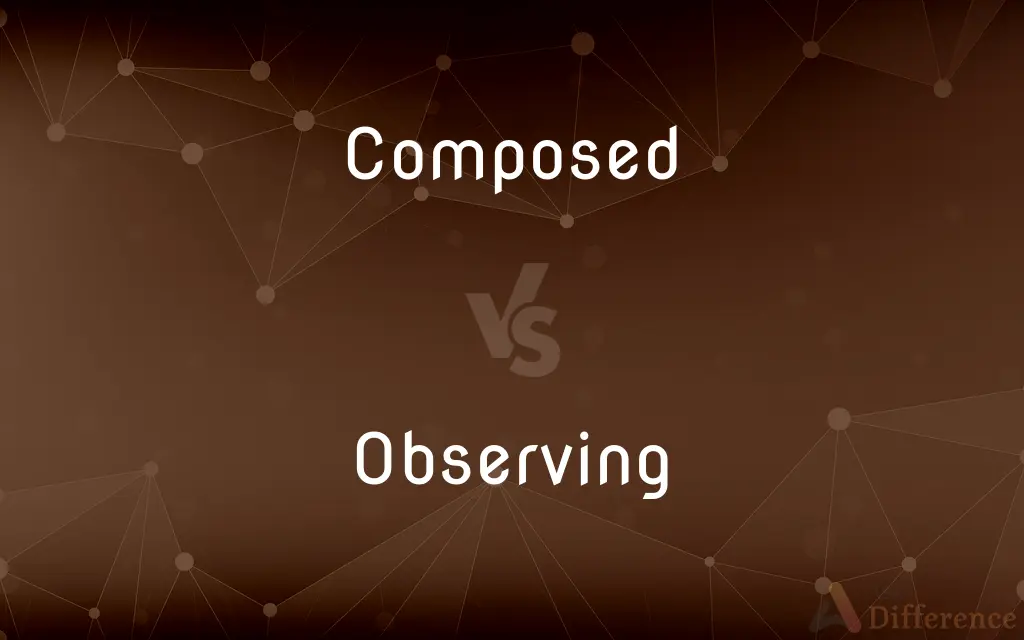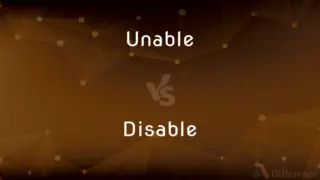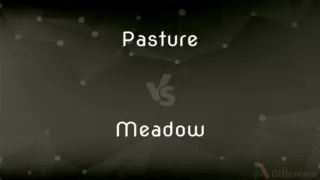Composed vs. Observing — What's the Difference?
Edited by Tayyaba Rehman — By Fiza Rafique — Updated on October 30, 2023
Composed refers to being calm and collected, while Observing means to watch or notice something.

Difference Between Composed and Observing
Table of Contents
ADVERTISEMENT
Key Differences
Composed and Observing are words that carry different meanings and functions. Composed often denotes a state of calmness or self-control. It is frequently used to describe someone who maintains their equanimity even in stressful or challenging situations. In this context, being composed is a trait that many strive for, especially when faced with adversity or unexpected events.
Observing, on the other hand, pertains to the act of watching, noticing, or paying attention to something or someone. This term can refer to both passive and active forms of watching, whether it's simply noticing something in passing or deliberately watching something for a particular purpose. Observing can be a conscious act, like a scientist observing an experiment, or an unintentional one, like observing a bird while walking in the park.
While someone who is composed might exhibit a serene exterior, they are not necessarily observing anything in particular. Similarly, someone who is observing may not be composed. They might be anxious, excited, or display any other emotion while watching something.
In a sentence, one might say, "She remained composed during the debate," emphasizing her calm demeanor. In contrast, "He was observing the bird's behavior," underscores the act of watching. Hence, while Composed and Observing can exist simultaneously in a situation, they address different facets of human behavior and experience.
Comparison Chart
Definition
Being calm and collected
Watching or noticing something
ADVERTISEMENT
Part of Speech
Adjective
Verb
Contextual Usage
Describes a state of being
Describes an action
Emotional State
Implies equilibrium and self-control
Does not necessarily imply an emotion
Activity Level
Passive
Active or passive depending on usage
Compare with Definitions
Composed
Composed can imply a created or structured arrangement.
The artist composed a beautiful song.
Observing
Observing can refer to noticing or perceiving something.
Observing his behavior, she knew something was wrong.
Composed
Composed can refer to something being made up of various parts or elements.
Water is composed of hydrogen and oxygen.
Observing
Observing can denote celebrating or acknowledging an event.
They were observing his birthday with a surprise party.
Composed
Composed means being calm and undisturbed.
Despite the chaos, she remained composed.
Observing
Observing implies adhering to customs or laws.
They were observing the traditions of their ancestors.
Composed
Composed can signify being in control of oneself.
He was composed even in the face of criticism.
Observing
Observing means watching attentively.
She was observing the stars through a telescope.
Composed
Composed indicates a state of peace or tranquility.
His composed demeanor was reassuring.
Observing
To be or become aware of, especially through careful and directed attention; notice
Observed a car leaving the property.
Composed
Serenely self-possessed; calm
The speaker remained composed even when heckled.
Observing
To watch attentively
Observe a child's behavior.
Composed
Showing composure.
Observing
To make a systematic or scientific observation of
Observe the orbit of a comet.
Composed
Simple past tense and past participle of compose
Observing
To say casually; remark
"'It's nice to have somebody to wait on you,' she observed, with a laugh" (Upton Sinclair).
Composed
Free from agitation; calm; sedate; quiet; tranquil; self-possessed.
The Mantuan there in sober triumph sate,Composed his posture, and his look sedate.
Observing
To adhere to or abide by; comply with
Observe the terms of a contract.
Composed
Made up of individual elements;
If perception is seen as composed of isolated sense data...
Observing
To act in acknowledgment of (a holiday, for example); keep or celebrate
Observe an anniversary.
Composed
Serenely self-possessed and free from agitation especially in times of stress;
The performer seemed completely composed as she stepped onto the stage
I felt calm and more composed than I had in a long time
Observing
To maintain (silence or a period of silence), as out of respect for someone who has died.
Observing
To take notice
Stood by the window observing.
Observing
To say something; make a comment or remark
Observed upon the unusual weather.
Observing
To watch or be present without participating actively
We were invited to the conference solely to observe.
Observing
Present participle of observe
Observing
Observation
Observing
Giving particular attention; habitually attentive to what passes; observant{1}; as, an observing person; an observing mind.
Observing
Quick to notice; showing quick and keen perception
Observing
Observing entails keeping something under systematic review.
The scientist was observing the reaction over time.
Common Curiosities
Can someone be both composed and observing?
Yes, someone can be calm (composed) while actively watching (observing) something.
Is composed only used to describe people?
No, composed can also describe things, like a piece of music or the elements making up an object.
Can observing refer to following traditions?
Yes, observing can mean adhering to or celebrating customs, traditions, or laws.
Is being composed an emotional state?
Yes, being composed typically refers to a calm and controlled emotional state.
Is being composed the same as being indifferent?
No, being composed means being calm and controlled, not necessarily indifferent or uncaring.
Does observing always mean actively watching?
No, observing can be both active, like studying a subject, or passive, like noticing something incidentally.
Is being composed a permanent state?
No, being composed is a temporary state that can change based on situations or stimuli.
Does composed only refer to emotional calmness?
While often used in that context, composed can also refer to being made up of parts or elements.
What's the opposite of being composed?
The opposite of being composed might be being agitated, upset, or frantic.
Can observing be unintentional?
Yes, one might observe something without the intention to, simply by noticing it.
Is observing an active verb?
Observing is an active verb, but its action can be either active (intentionally watching) or passive (incidentally noticing).
Can observing be synonymous with celebrating?
Yes, in contexts like "observing a holiday," it means celebrating or acknowledging.
Can a composition refer to a written work?
Yes, a composition can refer to a piece of writing.
Does observing imply understanding?
Not necessarily. Observing refers to noticing or watching, but not always understanding.
Does observing always require focus?
Not always. One can observe something passively without focused attention.
Share Your Discovery

Previous Comparison
Unable vs. Disable
Next Comparison
Pasture vs. MeadowAuthor Spotlight
Written by
Fiza RafiqueFiza Rafique is a skilled content writer at AskDifference.com, where she meticulously refines and enhances written pieces. Drawing from her vast editorial expertise, Fiza ensures clarity, accuracy, and precision in every article. Passionate about language, she continually seeks to elevate the quality of content for readers worldwide.
Edited by
Tayyaba RehmanTayyaba Rehman is a distinguished writer, currently serving as a primary contributor to askdifference.com. As a researcher in semantics and etymology, Tayyaba's passion for the complexity of languages and their distinctions has found a perfect home on the platform. Tayyaba delves into the intricacies of language, distinguishing between commonly confused words and phrases, thereby providing clarity for readers worldwide.














































